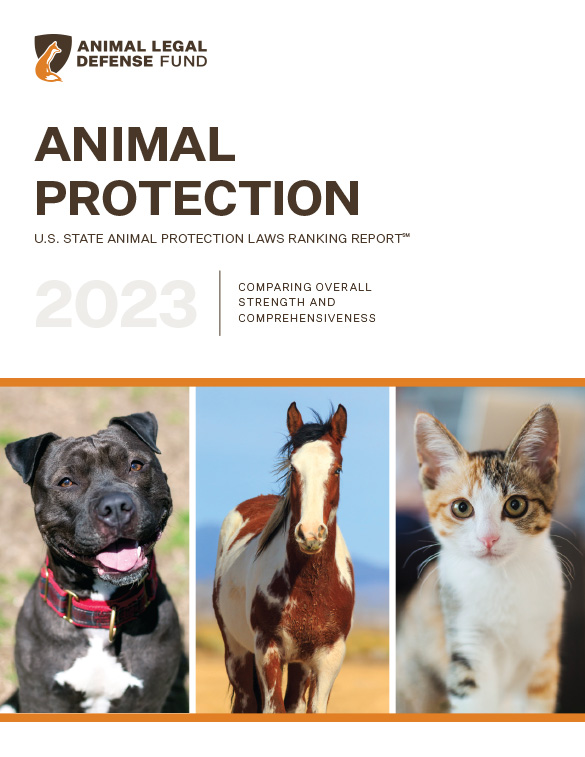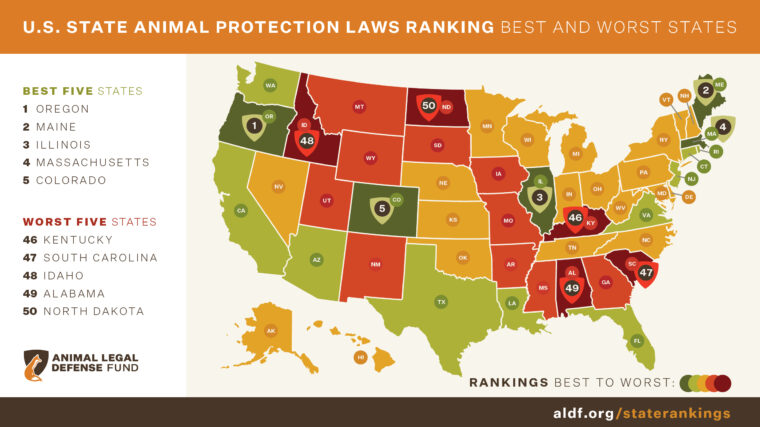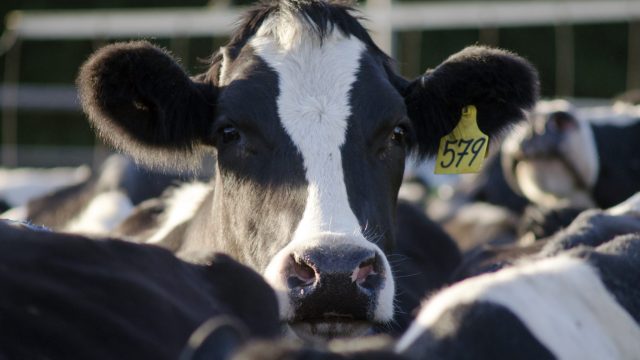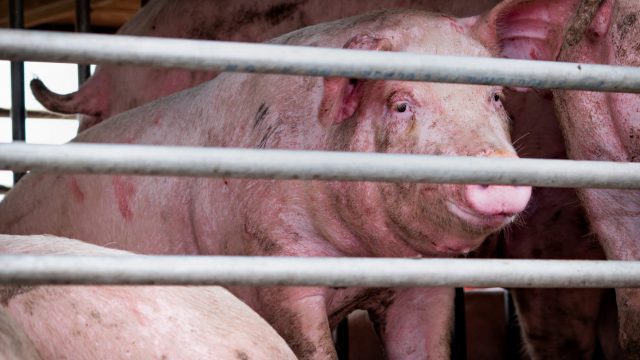
Idaho Ranked Third-Worst State for Animal Protection Laws
2023 U.S. State Animal Protection Laws Ranking Report Released
Contact: media@aldf.org
SAN FRANCISCO, CA — For the first time, North Dakota ranks as the worst state for animal protection laws according to the annual U.S. State Animal Protection Laws Ranking Report published by the Animal Legal Defense Fund, the nation’s preeminent legal advocacy organization for animals.
The longest-running and most authoritative report of its kind, the 18th annual year-end report (2023) assesses the relative strengths and weaknesses of each U.S. state and territory’s animal protection laws, and ranks them accordingly.
North Dakota is followed by Alabama (49), Idaho (48), South Carolina (47), and Kentucky (46), rounding out the states with the weakest animal protection laws. Oregon seized the first-place rank — followed by Maine (2), Illinois (3), Massachusetts (4), and Colorado (5).

Idaho earned its 48th spot in the rankings because state lawmakers have yet to pass a number of important protections. For example, Idaho does not have any law requiring veterinarians or social services workers to report suspected animal cruelty, despite the fact that those professions are more likely to encounter animal cruelty in their work. Additionally, in Idaho even some of the most egregious animal cruelty offenses, such as torturing companion animals, are misdemeanors upon the person’s first conviction.

A new trend highlighted in the report is “bond-or-forfeit” laws, which help alleviate the financial burden on cities and counties caring for animals who have been seized pursuant to an animal cruelty case. It may take months or even years before a criminal case is fully adjudicated. During that time, the animal victims are often left in a type of legal limbo, being cared for by a local city or county shelter while still technically being the property of the defendant. The costs of caring for these animals accumulate quickly, especially if the animals require extensive veterinary treatment to recover from their neglect or abuse. “Bond-or-forfeit” laws resolve this issue by requiring the defendant to either post a bond covering the costs of caring for the animal or forfeit their property interest in the animal so they can be adopted out into a new, loving home.
“Each year, the Animal Legal Defense Fund is encouraged to see many jurisdictions strengthening their animal protection laws to improve the well-being of animals,” says Animal Legal Defense Fund Executive Director Chris Green. “However, this annual evaluation shows that, regardless of rank, every state and territory still has room to improve, and additional legislative progress is needed to ensure that all animals are afforded the same level of protection across the country.”
The rankings track which states are taking animal protection seriously and are based on a comprehensive review of each jurisdiction’s animal protection laws, including over 3,600 pages of statutes.
The full report, including details about each state, is available at www.aldf.org/staterankings.
Sign Up!
Join the Animal Legal Defense Fund's email list to stay up to date on lawsuits, legislation, and regulations affecting animals.
Focus Area
How We Work
Related
-
Animal Legal Defense Fund Grant Supported Washington Attorney General’s Enforcement of Animal Cruelty Law
The judge sentenced a Snohomish County resident for killing then displaying neighborhood wildlife and shooting a kitten in the eye.April 18, 2024 News -
REPORT: 95 Percent of Consumers Prefer “Climate-Friendly” Products, But Labels Oversell Emission Reductions
New report reveals how misleading labels lead to increased confusion among consumers searching for more sustainable, less environmentally damaging products.April 2, 2024 Press Release -
Lawsuit Filed Demanding FDA Respond to Petitions Seeking to Ban Ractopamine
FDA’s approval for ractopamine relied primarily on safety studies conducted by the drugmaker.March 26, 2024 Press Release




